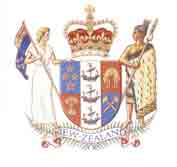Our House: A house of representatives should, ideally, be ...
International perspectives on democracy: Commonwealth heads of government leaders said in their ...
Electing Parliament: The MPs and the political parties in New Zealand's Parliament are elected ...
Members of Parliament: In the 27 July 2002 general election, Labour gained 52, National 27, New Zealand ...
Forming the government: The Labour and Progressive Coalition Parties in Parliament have agreeed ...
Composition of Parliament: New Zealand's Parliament is a place where more and more sections ...
The New Zealand Business and Parliament Trust: The New Zealand Business and Parliament Trust was formed in 1991 to bridge ...
The role of the speaker: The Speaker of the New Zealand House of Representatives is the highest officer ...
Who drafts the laws? To make sure laws ar written correctly, Parliament has ...
The Office of the Clerk: The position of Clerk of the House of Representatives is one of the oldest ...
Parliamentary Service: The Parliamentary Service is one of two parliamentary agencies providing ...
What MPs do: Conventions, not job descriptions, guide what ..
MP's pay: Members of Parliament currently receive a ....
Living two lives: John Key, aged 41, National MP for Helensville, was an investment ...
From Youth MP to youngest MP: Darren Hughes, at 24 New Zealand's youngest ...
Government and Opposition: There is a tradition of thinking that asserts that ideas change with ...
How laws are made: Parliament is New Zealand's supreme law-making body. It's members study ...
Select committees: After a bill is introduced to Parliament and has been given its ...
Petitioning Parliament: Every New Zealand citizen or resident has the right to petition Parliament ...
Visiting Parliament: People come for many reasons to tour New Zealand's Parliament ...
150 years: The New Zealand Parliament celebrates its 150th ...
Who drafts the laws?
Crafting the clauses
Cabinet priorities
Access to the laws
To make sure laws are written correctly, Parliament has created the Parliamentary Counsel Office (PCO).
Crafting the clauses
The PCO drafts most of the laws voted on by MPs. The ministry or department concerned with a particular law works on the policy issues, while the PCO provides the technical expertise in law-drafting. Inland Revenue is the only department with legal authority to draft laws itself and not use PCO services.
The PCO also drafts the amendments to government bills requested by select committees. A Parliamentary Counsel will attend a committee’s confidential consideration of a bill to advise the committee on drafting and to draft the committee’s amendments.
The PCO also provides drafting services during consideration of a Member's bill, subject to the approval of the Attorney-General. This is usually given if the committee wants the bill to proceed after it has heard the submissions on it.
Cabinet priorities
The PCO’s work programme for bills is determined by Cabinet, which sets legislative priorities. At the beginning of each year it decides which legislation is most urgent, and which can wait.
There are always more bills that Ministers and departmental policy advisers want drafted than there are drafters to do the legal work, or time in the parliamentary session to debate them. Priority-setting is a matter of political choice.
Access to the laws
The PCO makes sure that bills, Acts and regulations are published and are accessible to the public. It does this in two ways: printed copies are distributed to bookshops for sale, and unofficial versions of up-to-date laws are made available on the Internet free of charge.
If you want to buy a printed copy of a bill, Act or regulation, you
can enquire at Bennetts Government Bookshops or contact Legislation
Direct. If you want free access to up-to-date law, the web address is
www.legislation.govt.nz.
|
|
|
||||||||||||||||||||||||||||||||||||

Parliamentary Counsel Office
Te Tari Tohutohu Paremata
Every
clause needs to be exactly right.


